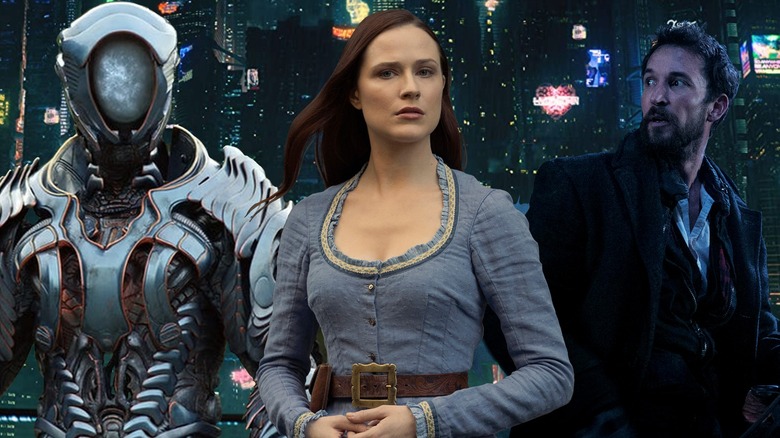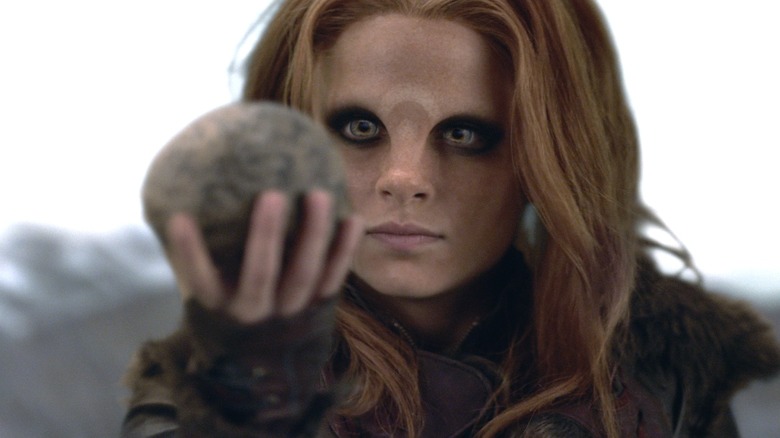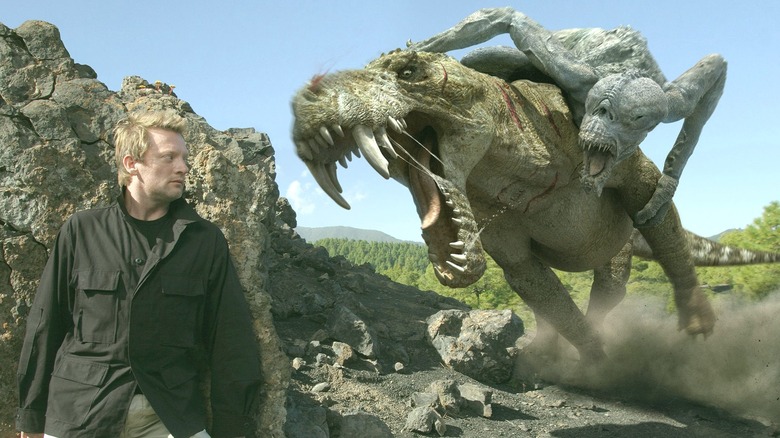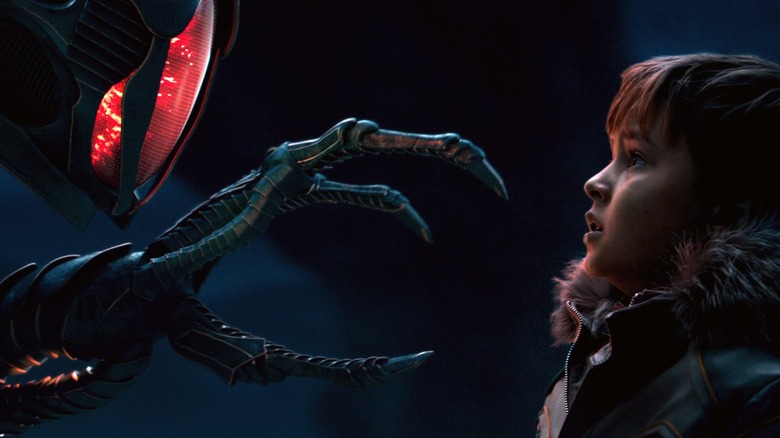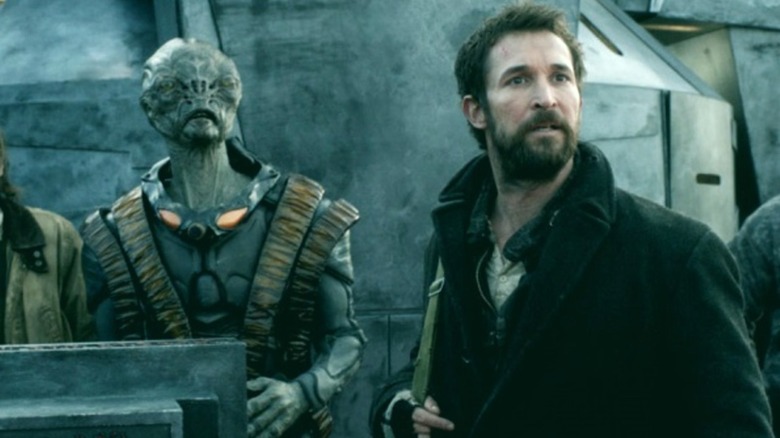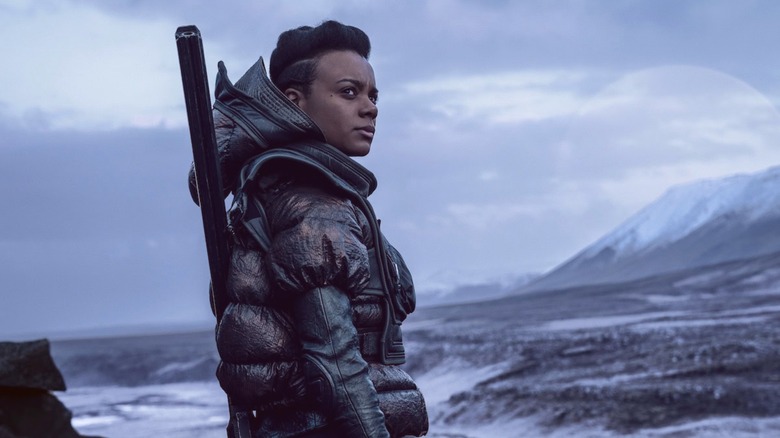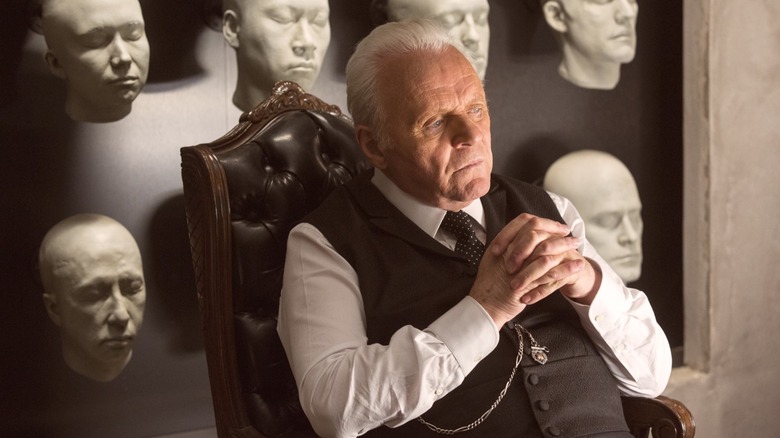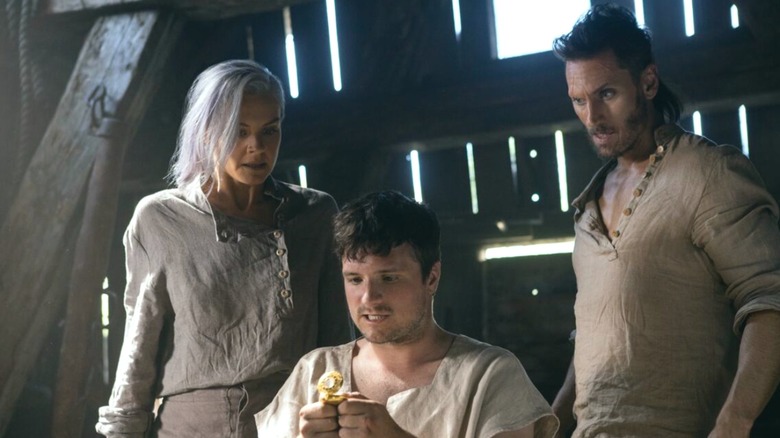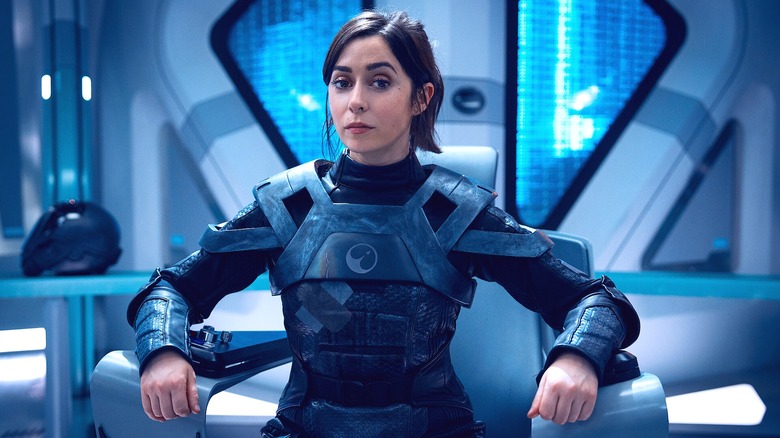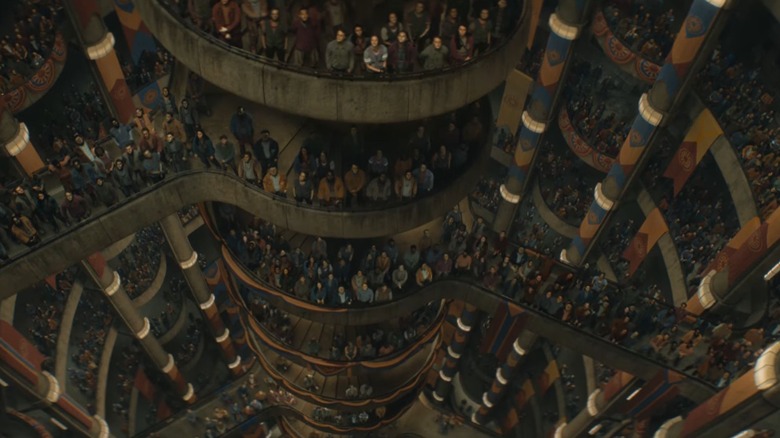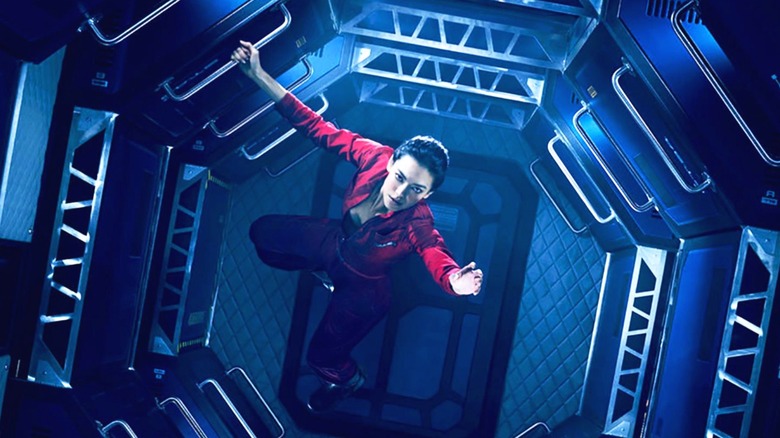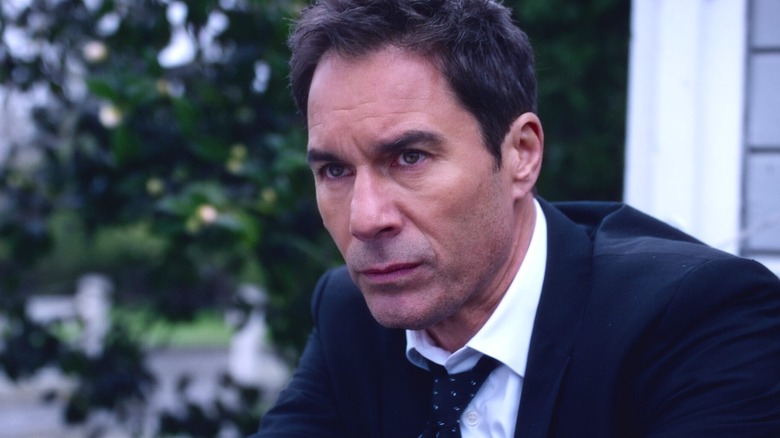12 Ambitious Sci-Fi Shows Like Steven Spielberg's Terra Nova
Science fiction is a broad, aspirational genre, touching on numerous areas of popular culture. Unfortunately, not every sci-fi show can be the next "X-Files" or "Fringe." Some science fiction concepts don't work as well as others, and it's not uncommon for series like "Firefly" to get booted off the air, upsetting the fans. "Terra Nova" was an ambitious Steven Spielberg-produced series that debuted in 2011, documenting a family as they helped establish a colony 85 million years in the past.
They do this to escape the overpopulation and pollution of 22nd-century Earth, and settling in the Cretaceous Period offers a dinosaur-filled refuge. Unfortunately, like so many high-concept sci-fi projects, Fox canceled "Terra Nova" before it had a chance to get off the ground, ending after just one season. This was primarily the result of high production costs that didn't balance against the low viewership numbers — a common ailment of sci-fi shows.
"Terra Nova" still has plenty of fans who appreciate the series' dynamic approach to time travel, politics, terrorism, and how a family will do whatever is necessary to survive. Each of these sci-fi shows was beloved and offered something new to the genre, much like "Terra Nova." They all stand as excellent examples of how science fiction can be done well for the small screen. While some of these shows shared the fate of "Terra Nova," others thrived.
Defiance
Post-apocalyptic dystopian futures like the world depicted in "Terra Nova" are common in sci-fi, but "Defiance's" approach is unique. The series is set in the mid-21st century on Earth that's been wildly transformed by alien terraforming technology. The planet's ecosystems barely resemble Earth's original animal and plant life. In addition, the terrain has been altered considerably, making the primary setting of St. Louis, Missouri, all but unrecognizable, save for the ruins of the Gateway Arch.
Defiance is the name of the city-state that replaced the ruined city, and the story focuses on Joshua (Grant Bowler) and his daughter Irisa (Stephanie Leonidas), adding a family dynamic that fans of "Terra Nova" can appreciate. Another similarity is the inclusion of new and dangerous animals, and while they aren't dinosaurs, they're nonetheless deadly. Tony Curran plays an alien named Datak Tarr, while Julie Benz plays the town's mayor.
"Defiance" was an ambitious sci-fi series that you can watch in its entirety, though SyFy canceled it after the completion of its third season due to declining ratings. The series was brought to life by Rockne S. O'Bannon, who developed "Farscape," and it's very much a futuristic sci-fi western, offering plenty of genre crossover to keep the action going. While "Defiance's" ratings faltered, the series was beloved by many and maintains a rating of 77% on Rotten Tomatoes, with a Popcornmeter of 85%.
Primeval
Before "Terra Nova," the British series "Primeval" explored time travel, dinosaurs, and portals, so there are many common elements between the two shows. Instead of sending people into the past, "Primeval" is set around anomalous portals that arise throughout the United Kingdom. This allows creatures from far back in Earth's past, as well as those from the future, into the present. As more portals continue to open, humanity finds itself on new ground as the action spreads across multiple seasons.
The series was somewhat hit or miss, as each season either stood out with praise or suffered from lackluster viewership. This resulted in a cancellation after Season 3, but three months later, it found its way back to the small screen. "Primeval" ran for five seasons, comprising 36 episodes. Poor ratings finally killed it, but the franchise continued with tie-in novels and a spin-off, "Primeval: New World," which was canceled after 13 episodes.
One of the more interesting aspects of "Primeval" is the variety of creatures spread across the seasons. Many were based on real prehistoric animals like those seen in "Terra Nova," but purposefully altered to make them significantly larger. The series was the brainchild of Tim Haines, best known for the groundbreaking documentaries "Walking With Dinosaurs" and other "Walking With" shows. His decision to eschew scientific accuracy helped make "Primeval" more entertaining.
Lost in Space (2018)
"Lost in Space" reimagines the concept of the 1960s series while maintaining the thematic connection to Johann David Wyss' "The Swiss Family Robinson." If you enjoyed how "Terra Nova" centered around a family in an unfamiliar and dangerous setting, "Lost in Space" is worth your time. While it has nothing to do with Earth's past, it follows the Robinson family as they join a group of colonists on a mission to settle a planet outside of Earth's solar system after a cataclysm upends the climate.
Unfortunately, the mission goes off the rails when an alien robot infiltrates the colony ship, forcing the Robinsons to flee in their Jupiter 2 spacecraft and leaving them to desperately try to find their way back to human-controlled space. The series features plenty of impressive talent, including Dr. Smith's actor, who some might recognize if they're familiar with a popular 1990s indie queen.
She's joined by Molly Parker, Toby Stephens, Maxwell Jenkins, Taylor Russell, and Mina Sundwall, all of whom play Robinson family members, while Robot (Brian Steele) is a standout non-human character. In terms of scientific accuracy, "Lost in Space" worked hard to make it as realistic as possible. The show ran for three seasons, concluding in 2021 with nearly all of the character arcs being resolved. The series received positive buzz from critics and audiences, achieving an 84% on Rotten Tomatoes.
Falling Skies
While fans know Noah Wyle from "The Pitt" and "ER," his 2011 sci-fi series is extraordinary. "Falling Skies" is a post-apocalyptic show about a former history-teacher-turned-high-ranking member of the 2nd Massachusetts Militia Regiment. The unit was formed from the remnants of the U.S. military after an alien invasion destroyed civilization. The story told throughout the five seasons of "Falling Skies" shows the fight between humans and their would-be alien overlords.
The surviving humans, of which only around 10% remain, use conventional weaponry and paramilitary tactics in an incredibly austere environment to take the fight to them. While "Falling Skies" is well within the sci-fi genre, it's grounded in the characters who make up the survivors. In this way, many of the themes of "Falling Skies" mirror those of "Terra Nova," especially where politics and the military are concerned.
The appeal of "Falling Skies" is how in-the-trenches you feel watching it, as if you're fighting alongside the resistance. Wyle excels in his role, and he's joined by Moon Bloodgood, Will Patton, Drew Roy, and other talented actors. Like "Terra Nova," Steven Spielberg worked as an executive producer, but unlike that show, "Falling Skies" managed to complete its story arc, closing out after five seasons of 52 episodes. The series was well received, earning a 79% rating on Rotten Tomatoes.
Foundation
When it comes to high-concept sci-fi, look no further than "Foundation," based on famed science fiction writer Isaac Asimov's most ambitious series. "Foundation" is to sci-fi as "Lord of the Rings" is to fantasy — it's grand storytelling, and adapting it into a television series seemed unlikely for decades. Fortunately, the folks at Apple TV+ didn't get that memo, and "Foundation" arrived in 2021. The series features a stellar cast, including Lee Pace, Terrence Mann, Laura Birn, Jared Harris, and many more.
"Foundation" depicts the Galactic Empire spread across the cosmos, comprising many worlds. In the books, the Empire consists of 25 million inhabited planets, and they track its inevitable decline. Hari Seldon's (Harris) psychohistory aims to put things back on track over an anarchical 30,000-year period of disparate human and cultural decline. The show hasn't followed this narrative and deviates considerably, but fans of the novels don't seem to mind. "Foundation's" third season premiered in July 2025, and there are plenty more stories to tell.
While the plots of "Foundation" and "Terra Nova" are quite dissimilar, the overarching themes align rather well. Each series focuses on the balancing of order and chaos and the concept of second chances. Another primary theme is the way a single individual can impact a societal change against massive social and governmental forces. Since its debut, "Foundation" has enjoyed widespread acclaim, earning an 86% rating on Rotten Tomatoes.
Westworld
"Terra Nova" explores the primitive world, while HBO's "Westworld" explores a futuristic, Wild West-themed park peopled with lifelike androids called "hosts." It's a new take on the 1973 feature film that inspired it, while it also draws inspiration from the sequel, "Futureworld." Thanks to improvements in VFX technology, it's far more realistic than previous incarnations, though the original "Westworld" was a standout of 1970s sci-fi as the first film to feature CGI.
Nothing is off limits in Westworld in terms of what guests can do to the androids. When one is damaged of "killed," it's rebuilt and returned with no memory of what happened before. Things begin to change when the hosts come to realize their servile nature and the abuses they've endured. Where "Terra Nova" had dinosaurs, "Westworld's" dangers are far more insidious, as they look like regular people. "Westworld" was a massive initial success, garnering numerous accolades, including seven Primetime Emmy Awards.
It features an incredible cast that utilizes many veteran players, including Jeffrey Wright, Ed Harris, Evan Rachel Wood, Thandiwe Newton, and Anthony Hopkins, though many more came and went as "Westworld" progressed. The show ran for four seasons, comprising 36 episodes, but viewers began to sour on it after the second season and ratings declined, resulting in its cancellation in 2022. Unfortunately, like "Terra Nova," this left numerous storylines and character arcs unresolved.
Future Man
"Future Man" is a comedy sci-fi series everyone binged on Hulu when it premiered in 2017. It centers around Josh Futterman (Josh Hutcherson), the only gamer to beat the "Biotic Wars" video game. Upon completion, Tiger (Eliza Coupe) and Wolf (Derek Wilson) arrive from the future to recruit him to prevent the real Biotic Wars. "Future Man" is surprisingly grounded in science, addressing paradoxes, cause and effect, and the dangers of altering the past.
The series ran for three seasons, comprising 34 episodes, ending conclusively. What's most fascinating about "Future Man" is that each season is wildly different. The format changes from one to the next, which is a risky venture for a TV show. "Future Man's" time travel mechanic makes it somewhat similar to "Terra Nova," with a twist. In both series, the past is seen as the future's salvation, but in "Future Man," it's less about all of humanity and more about a select few.
Despite the way the show jumps around from one setting to the next, it's all tied together in a brilliantly written exploration of how not to travel through time. It's no surprise that humor was on the minds of veteran comic filmmakers Seth Rogen and Evan Goldberg, who served as executive producers. "Future Man" is a fun, gross-out, sci-fi adventure that's decidedly NSFW, boasting a 91% on Rotten Tomatoes.
Black Mirror
In "Terra Nova," technology both destroys the world and offers its salvation through colonization of the past. In much the same way, "Black Mirror" depicts the potential perils of technology in a near-future setting. More advanced tech is often seen as progress and even salvation, but "Black Mirror" exposes this fallacy as each episode tells a unique story that ties the series together through common themes. When it launched in 2011, "Black Mirror" garnered widespread acclaim for its fantastic storytelling and exceptional dystopian concepts.
As of 2025, "Black Mirror" has released seven seasons, each consisting of three to six episodes. Between Seasons 2 and 3, a special aired, as well as a choose-your-own-adventure-style film, "Black Mirror: Bandersnatch." "Black Mirror" has been wildly successful for Netflix, which produced two webisode series. There's also a tie-in book for the first four seasons, "Inside Black Mirror."
Because technology is at the forefront of "Black Mirror's" theme, it grounds the series in science fiction, as much of the tech seems plausible or similar to something that actually exists. This makes the stories more engaging, as it's easy to imagine seeing something like what appears on screen in real life. The prevailing theme of "Black Mirror" is a cautionary tale about the potential dangers of overreliance on technology, matching many elements of "Terra Nova" and other dystopian series.
Silo
Graham Yost's excellent "Silo" book series inspired the creation of the Apple TV+ show, which premiered on the streaming service in May 2023. "Silo" depicts a dystopian future, where a society of around 10,000 people live in a massive underground silo. The structure extends 144 40-foot-tall levels into the Earth, and everyone inside is tightly controlled. Much like "Terra Nova," which stores survivors deep into the past under tight regulation, the people inside the silo seek survival, answers, and freedom.
Rebecca Ferguson plays the lead alongside Rashida Jones, Tim Robbins, and Steve Zahn, among others, all of whose characters know nothing of their history. "Silo's" world is toxic, and the environment is ruined, requiring people to wear protective suits if they were to venture outside, which is absolutely forbidden. What's fascinating about "Silo" is how the characters know nothing about their situation — who built the silo, how they got there, why they're underground, and the true nature of the world outside.
Since its premiere, "Silo" has garnered widespread critical and audience acclaim, earning a 90% rating on Rotten Tomatoes. The show is dark and gritty sci-fi at its best — there's a widespread conspiracy and nobody knows the truth of what's going on, leading to speculation on the part of the characters, as well as the audience. The series' success led to renewals for a third and fourth final season.
Humans
"Humans" explores the impact of artificial intelligence on a society's culture and the psychology of the people who interact with them. In "Humans," humanoid robots are called "synths," and they're all but indistinguishable from real people. The series features a breakout performance by Gemma Chan, who plays a domestic synth belonging to a family.
Unfortunately for the Hawkins clan, she's fully self-aware, which compounds the complexity of the various relationships explored in the show. There are close parallels in "Humans" to "Terra Nova's" depiction of how technology can impact a family in a progressively dynamic situation, as each series places a great deal of emphasis on these relationships. While "Humans" continued for another two seasons, totaling 24 episodes, Channel 4 in the United Kingdom canceled it in May 2019. It's unclear why the show was axed, as it generated considerable buzz during its time on the air.
Season 1 landed at 89%, Season 2 rose to 94%, and Season 3 topped out at an impressive 100%. It's likely that a decline in viewership was to blame, which is unfortunate, as a fourth season was planned. While "Humans" is gone, the three seasons that were produced are excellent science fiction that fans of "Terra Nova" would appreciate.
The Expanse
Where "Terra Nova" explores the past, "The Expanse" explores the solar system, which humanity has fully colonized. The series focuses on three primary characters: Chrisjen Avasarala (Shohreh Aghdashloo), James Holden (Steven Strait), and Josephus Miller (Thomas Jane). Politics is a large factor, as three primary powers set the stakes: the United Nations of Earth and Luna, the Outer Planets Alliance, and the Congressional Republic on Mars.
The discovery of alien technology puts the entire system in jeopardy, as a massive conspiracy takes shape. One of the reasons "The Expanse" is such a great sci-fi series is its outstanding character development as the show explores politics and other potentially dangerous issues. In this way, fans of "Terra Nova" can appreciate several narrative themes in "The Expanse" that are similar, ensuring they'll find it just as entertaining. "The Expanse" was well-received and won numerous accolades. It took home three Hugo Awards and a Saturn Award, but SyFy canceled it after three seasons.
When it was pulled from SyFy, "The Expanse" had a 100% on Rotten Tomatoes. Fortunately, the show didn't end there, because Amazon Prime Video picked it up for three more seasons, concluding "The Expanse" in 2022. In addition to the impressive visuals that are present throughout the show's run, "The Expanse" painstakingly worked to follow actual science whenever possible. Renowned astrophysicist Alex Filippenko praised it as "extreme science fiction" in an interview with SFGATE in 2021.
Travelers
"Travelers" is a show about time travel, but it's not handled in the same way as seen in "Terra Nova." In the series, humanity's future civilization is at an end, and much like in "Terra Nova," the past is seen as the only way forward. Thousands of operatives called Travelers have their consciousnesses sent back through time to replace the minds of people in the present who are about to die. This is accomplished by The Director, an artificial intelligence quantum supercomputer that controls the fate of humanity in the post-apocalyptic future, as well as in the present day.
Travelers maintain their host's lives and work to stop the calamity that befalls humanity in their collective past. The show is led by Eric McCormack, who takes over the body of an FBI agent. He's joined by MacKenzie Porter, Nesta Cooper, Jared Abrahamson, Reilly Dolman, Patrick Gilmore, and numerous recurring characters. "Travelers" presents a fascinating concept that's rarely been explored outside of a slightly similar method of time travel in "Quantum Leap" or the film "The Butterfly Effect."
The show is consistent in its narrative and concludes without leaving any arcs unresolved, though it leaves the door open for further exploration of the series' concept. Unfortunately, there has been no indication of a sequel or spinoff show as of 2025. "Travelers" is highly acclaimed and holds a 100% on Rotten Tomatoes. As a sci-fi series, "Travelers" is groundbreaking, high concept, and exceptionally well executed by everyone involved.
